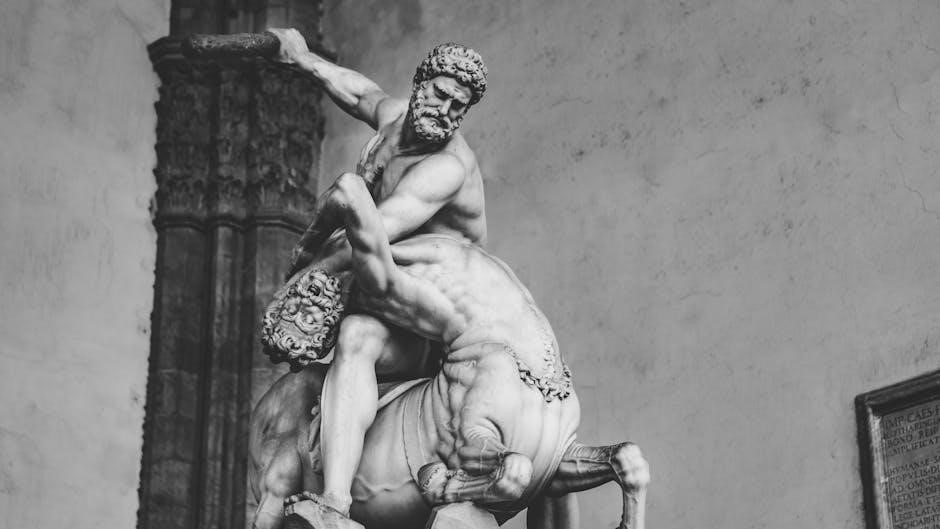Rick Riordan’s The Lost Hero kicks off The Heroes of Olympus series, blending Greek and Roman mythology with modern-day adventure. Introducing Jason, Piper, and Leo, it expands the Percy Jackson universe, offering a fresh yet familiar journey for fans of mythological fantasy.

Overview of the Book and Series
The Lost Hero by Rick Riordan is the first installment in The Heroes of Olympus series, a spin-off of the bestselling Percy Jackson and the Olympians saga. The book introduces a new trio of demigods—Jason Grace, Piper McLean, and Leo Valdez—as they embark on a quest to rescue the kidnapped queen of the gods, Hera. Set in a world where Greek and Roman mythology coexist with modern life, the series expands Riordan’s universe, blending familiar elements with fresh characters and plotlines. The Heroes of Olympus series consists of five books, with The Lost Hero laying the foundation for a sprawling, action-packed narrative that explores themes of identity, unity, and the clash of Greek and Roman mythological traditions.

Main Plot and Quest
The Lost Hero follows Jason, Piper, and Leo on a perilous quest to rescue Hera, the kidnapped queen of the gods, while battling monsters and rival demigods.
Jason’s Amnesia and the Start of the Journey
Jason Grace, a Roman demigod, awakens on a bus with no memory of his past. Accompanied by Piper McLean and Leo Valdez, he embarks on a journey to uncover his identity. His amnesia serves as a catalyst, driving the trio into a world of mythological dangers and unexpected alliances. As they navigate their quest, Jason’s forgotten past gradually surfaces, revealing his connection to the Roman camp and his divine lineage. This initial mystery sets the stage for their broader mission, blending personal discovery with epic adventure.

The Importance of Hera in the Story
Hera, the queen of the gods, plays a pivotal role in The Lost Hero as her capture by Gaea sparks the central conflict. Her absence disrupts the balance of power among the gods, creating tension between Greek and Roman demigods. The quest to rescue Hera becomes a unifying force for Jason, Piper, and Leo, highlighting the need for collaboration to restore stability. Hera’s significance extends beyond her role as a deity; she embodies the bridge between Greek and Roman mythologies, symbolizing the unity the demigods must achieve to prevent Gaea’s rise. Her captivity underscores the broader theme of divided loyalties and the necessity of overcoming differences to face common threats.
The Role of Greek and Roman Mythology
The Lost Hero masterfully intertwines Greek and Roman mythologies, creating a rich tapestry of ancient lore and modern adventure. The story introduces Roman demigods like Jason Grace, while familiar Greek characters from Percy Jackson’s world also play crucial roles. This blend highlights the historical tension between Greek and Roman traditions, as the demigods navigate their divided loyalties. Monsters, gods, and prophecies from both mythologies converge, creating a unique narrative that bridges the two worlds. Riordan’s approach not only educates readers about mythological differences but also showcases how these stories remain relevant in contemporary settings, appealing to fans of both cultures and fostering a deeper appreciation for their shared heritage.

Character Analysis
The Lost Hero introduces a diverse cast of demigods, each with unique abilities and struggles, whose growth and unity drive the story’s themes of identity and destiny.
Jason Grace: The Roman Demigod
Jason Grace, a Roman demigod and son of Jupiter (Zeus), awakens with amnesia, unaware of his past or his identity. His journey in The Lost Hero is a quest to reclaim his memories and understand his role as a demigod. As a Roman, Jason’s personality and abilities differ from Greek demigods, showcasing his leadership and strategic thinking. His loyalty and bravery shine as he leads Piper and Leo on a perilous mission to rescue Hera. Jason’s struggle with his dual identity as a Roman demigod adds depth to his character, highlighting themes of self-discovery and unity. His growth throughout the story underscores his importance in the larger mythological world.
Piper McLean: Daughter of Aphrodite
Piper McLean, daughter of Aphrodite, is a key figure in The Lost Hero, bringing charm and empathy to the group. Initially seen as a potential girlfriend to Jason, Piper’s role evolves as she confronts her own identity and the expectations tied to her mother’s legacy. Her ability to manipulate emotions proves crucial in their quest, while her compassion and loyalty strengthen the team’s bonds. Piper’s journey is one of self-discovery, challenging stereotypes and embracing her unique strengths beyond her mother’s influence. Her character adds emotional depth and highlights the importance of empathy in overcoming adversity, making her an essential member of the trio;
Leo Valdez: Son of Hephaestus
Leo Valdez, the son of Hephaestus, brings humor, ingenuity, and a knack for machinery to the story. As a demigod with the ability to control fire and repair mechanical objects, Leo’s skills are invaluable to the quest. His prankster personality and loyalty make him a cohesive part of the group, balancing out the tension with his light-hearted nature. Despite struggling with his father’s absence and feelings of inadequacy, Leo proves himself to be a resourceful and brave hero. His journey is one of acceptance and discovering his true potential, as he learns to embrace his unique talents and the legacy of his divine parentage. Leo’s character adds both humor and depth to the narrative, making him a fan favorite.

Themes and Motifs
Identity, unity, and destiny are central themes, as characters navigate self-discovery and collaboration. The story explores how diverse backgrounds and strengths unite to overcome challenges and forge a common purpose.
Identity, Unity, and Destiny

The themes of identity, unity, and destiny are deeply intertwined in The Lost Hero. Jason’s amnesia serves as a metaphor for self-discovery, as he uncovers his Roman heritage and embraces his role as a leader. Meanwhile, the unity of Greek and Roman demigods is central to the story, highlighting the power of collaboration to overcome ancient divisions. Each character’s unique abilities and backgrounds symbolize the strength found in diversity. The quest to save Hera and prevent war underscores the idea of a shared destiny, where individual identities merge into a collective purpose. Through their journey, the characters learn to embrace their true selves and trust one another, proving that unity is their greatest weapon against adversity.

Collaboration and Self-Discovery

In The Lost Hero, collaboration and self-discovery are central to the characters’ growth; Jason, Piper, and Leo must rely on each other’s unique strengths to navigate their perilous quest. Jason’s leadership skills and combat prowess are balanced by Piper’s charm-speaking abilities and Leo’s mechanical genius. Through their shared challenges, they learn to trust and understand one another, fostering strong bonds. Self-discovery is equally vital, as each character uncovers hidden truths about their past and their powers. Jason’s journey to reclaim his memories and embrace his Roman identity is particularly poignant. Together, they prove that collaboration is not just a strategy but a necessity, while self-discovery shapes their understanding of who they are and what they are destined to achieve.

Reception and Impact
The Lost Hero became a bestseller, praised for its engaging narrative and expansion of the Percy Jackson universe. Its success solidified Riordan’s status as a master of young adult fantasy, attracting a wide audience and setting the stage for the series’ continuation.
Popularity in Young Adult Fantasy Literature
The Lost Hero achieved remarkable success, debuting as a New York Times bestseller and captivating a broad audience. Its blend of mythology, relatable characters, and fast-paced action resonated deeply with readers. Fans of the Percy Jackson series praised the fresh perspectives of Jason, Piper, and Leo, while newcomers were drawn to the book’s standalone appeal. The novel’s ability to balance humor, adventure, and emotional depth solidified its place in young adult fantasy. It also sparked widespread discussion in online communities and book clubs, further amplifying its reach. Riordan’s masterful storytelling and innovative approach to mythology continue to inspire readers, making The Lost Hero a cornerstone of modern young adult literature.
